Shock and Dismay: Canadians on Trump’s Victory
November 15, 2016

In our latest survey of national opinion, we explored reactions to the election of Donald Trump as US President. Here’s what we found.
• The most common single words Canadians use to describe their reaction to Mr. Trump’s election were ‘shocked, surprised, disappointed, disgusted, and horror”.

• In answer to a separate probe, 40% said they were shocked at the result, and another 28% really surprised.
• Almost half (44%) of those we surveyed were “really dismayed” by Mr. Trump’s win, and another 22% were somewhat disappointed. One in five said they had a neutral reaction. Only 14% were pleased that Mr. Trump won.
• Dismay/disappointment was the majority reaction in every region of the country, among both men and women, across all age groups. The large majority of Liberal and NDP voters were unhappy with the result. Conservative Party supporters were more likely to be unhappy (44%) than happy (33%) with Mr. Trump’s win. In Alberta, where the largest proportion of conservative voters reside, only 25% of those we surveyed were pleased with the result.
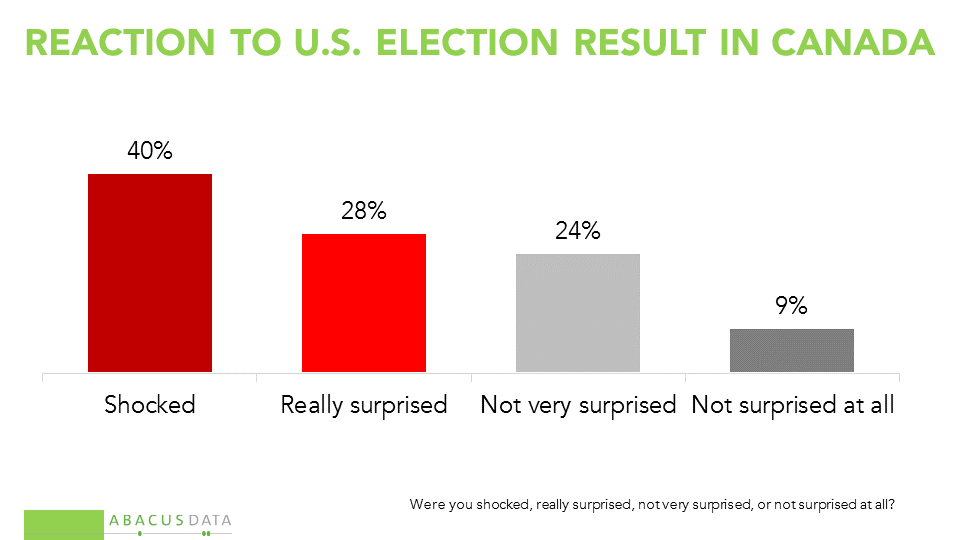
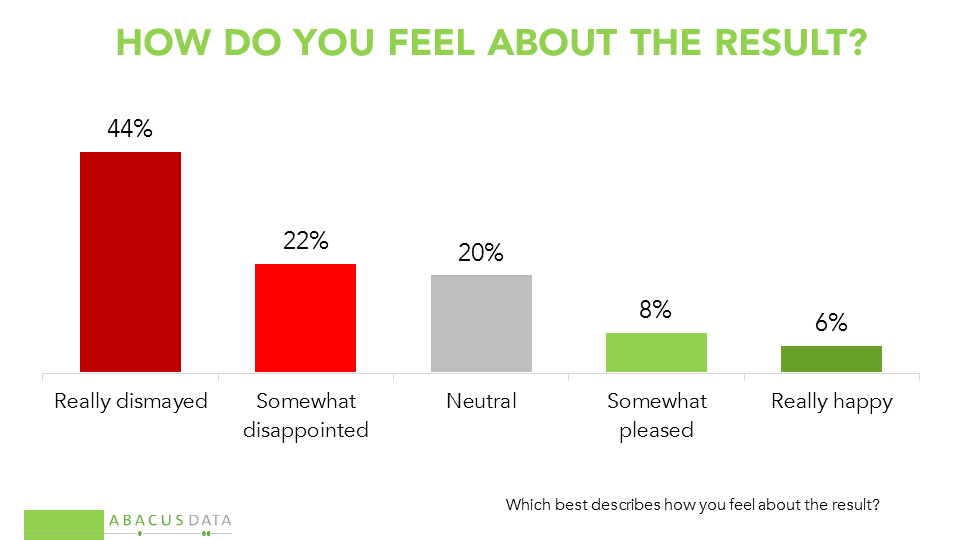
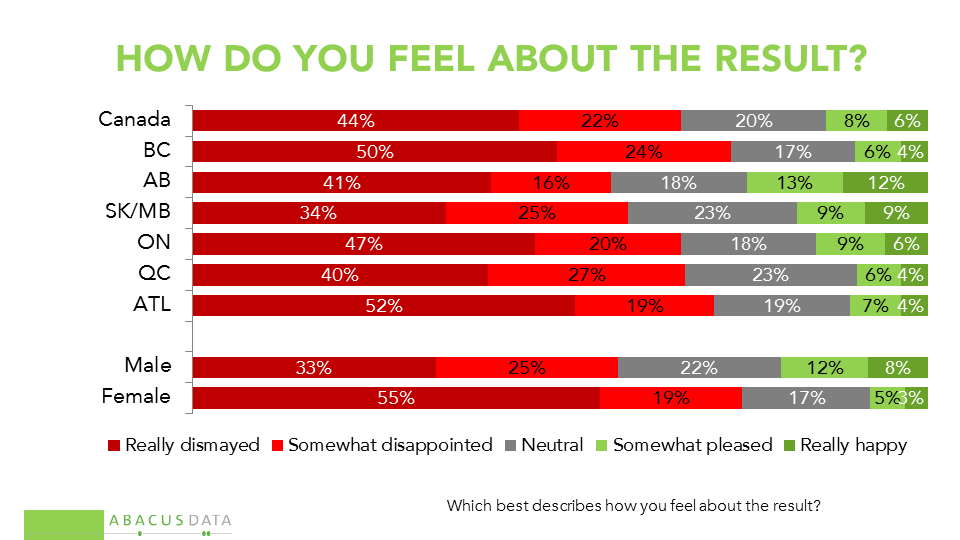
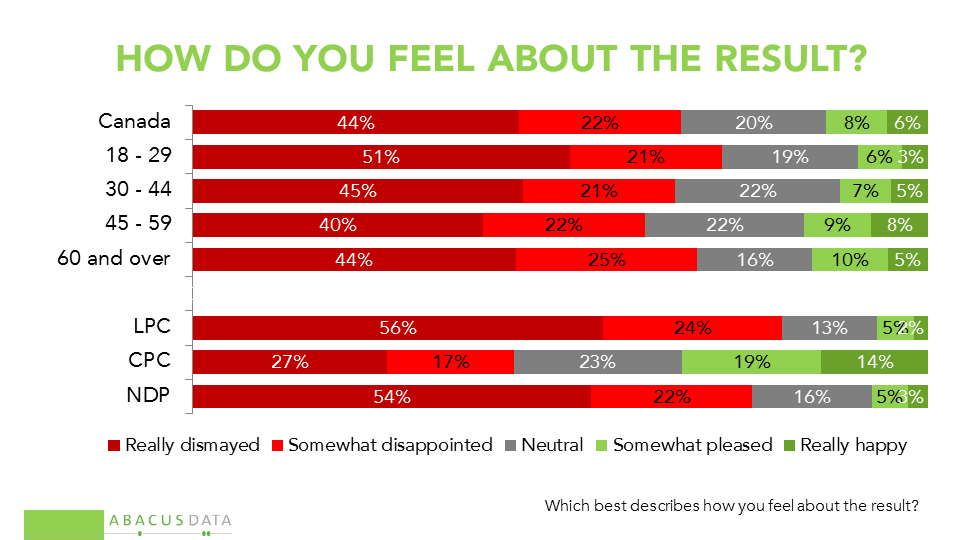
• By a very wide margin, Canadians see the Trump victory as having more to do with a lack of enthusiasm for Hillary Clinton, than enthusiasm for Mr. Trump. Women were more likely to cite a lack of enthusiasm for Clinton than men were (79% vs. 70%) while those who voted Conservative in 2015 were more likely to say the result was more about enthusiasm for Donald Trump (30%).
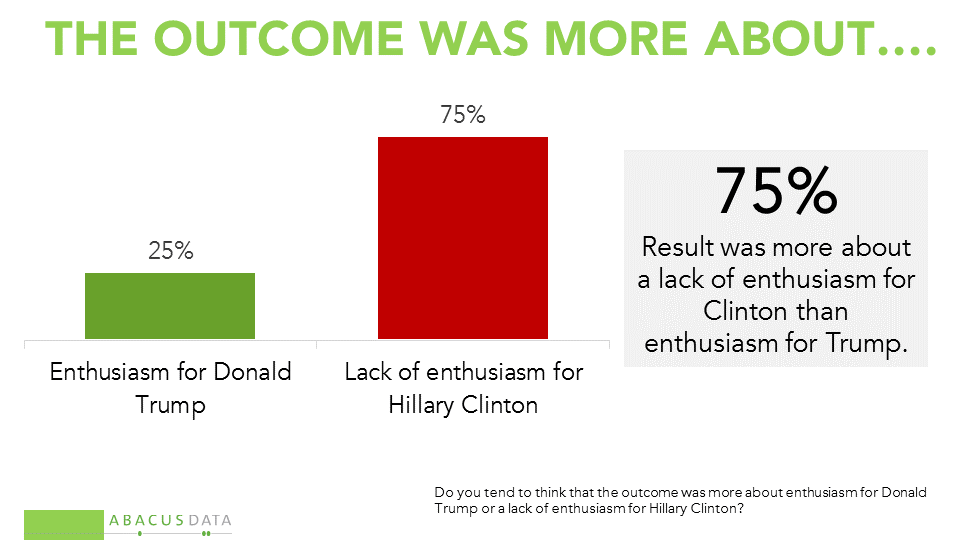
• Only 16% of Canadians said they would have voted for Mr. Trump. To put this in a different context, in the US Mr. Trump’s weakest result was in Hawaii, where he garnered 30% of the vote.
• In Canada, 52% say they would have cast a ballot for Ms. Clinton. Her result in the US was 48%, suggesting Canadians were not much more enthusiastic about Ms. Clinton as a candidate.
• Almost one in three Canadians (31%) say they would have voted for another candidate. Over six million Americans voted for a third party candidate, more than triple the number in 2012.
• Mr. Trump would have garnered only 9% support among Canadian women, only 27% among Alberta voters, and just 37% of Conservative Party supporters. An equal number of CPC voters would have cast a ballot for Ms. Clinton.
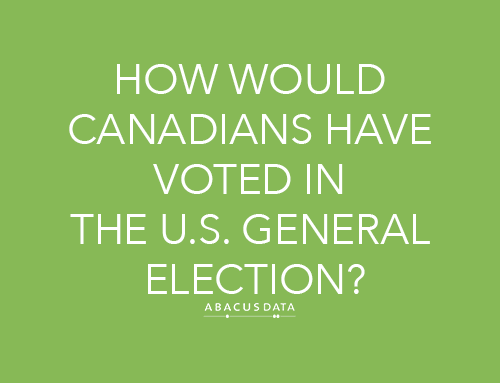

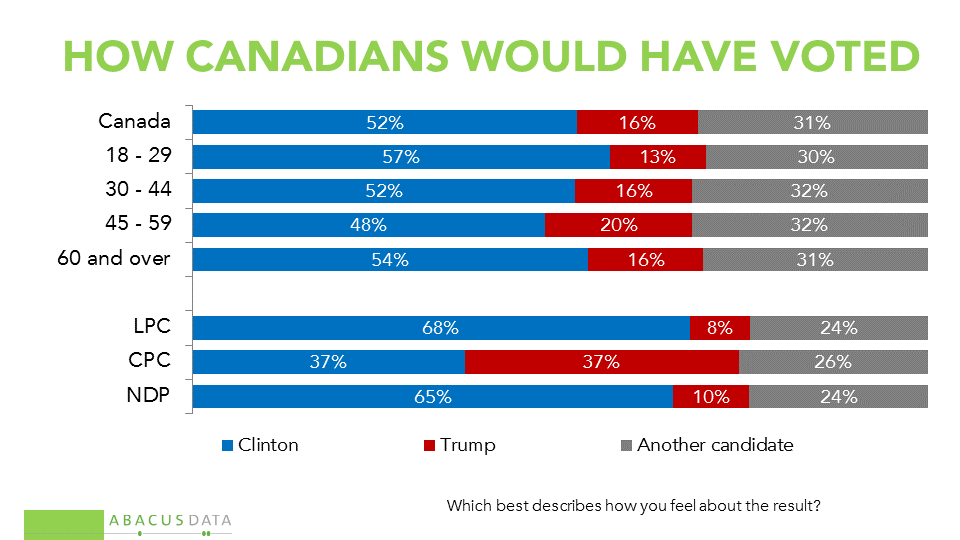
We also asked our respondents how they thought events would unfold in a Trump era.
• A huge majority (86%) expect greater tensions between white and non-white citizens. 62% expect many Mexican immigrants will be deported; 55% expect that will happen to many Muslims.
• 70% expect the US to develop closer ties with Russia; an equal number expect the US to enter a new war. Only 30% believe the US will defeat ISIS. Most (60%) say US power and influence in the world will decline.
• Most expect the US will suffer economically (68%); only 28% expect the US will become more powerful. Only 25% expect the US will become a “greater” country.
• Most (60%) say respect for women will decline and 42% believe abortion will become illegal.
• 70% expect the US to walk away from the climate change agreement, and 81% expect the Keystone XL pipeline to be approved.
• Less than half (38%) expect Mr. Trump will build a wall along the Mexico border, and even fewer (19%) believe Mexico will pay for the wall. A majority (60%) expect Mr. Trump to scrap NAFTA.
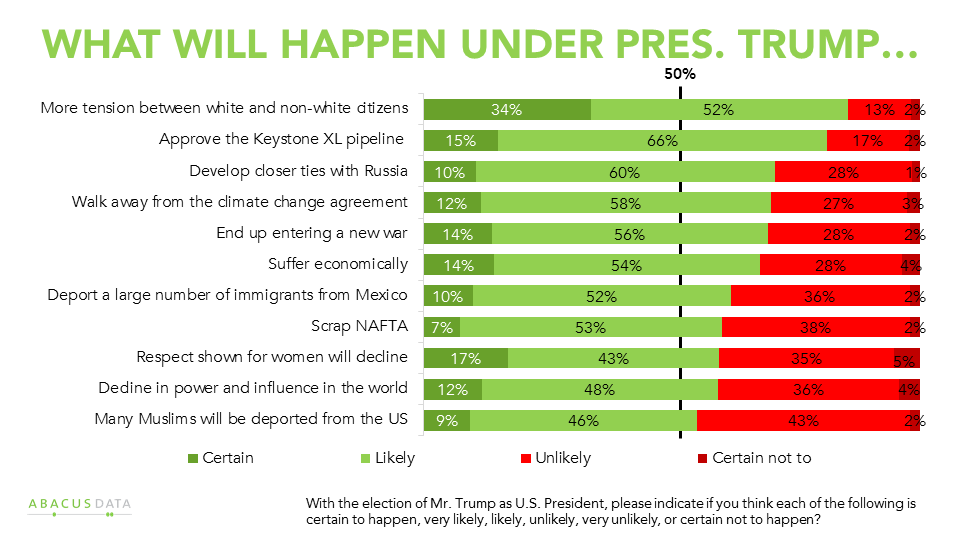

When asked about the Canada-US relationship respondents have tended to think the relationship might be neither good nor bad, but among the rest, two-thirds expected things to be worse rather than better between the two countries.
A majority of Canadians are open to the idea of a Canada-US free trade agreement if the US decides to exit NAFTA. Those living in Alberta (63%) and Ontario (60%) are more open to the idea of a Canada-US free trade agreement while Quebecers are least open to it (45%). Conservative voters (66%) are more supportive than Liberal (54%) or NDP (48%) voters.
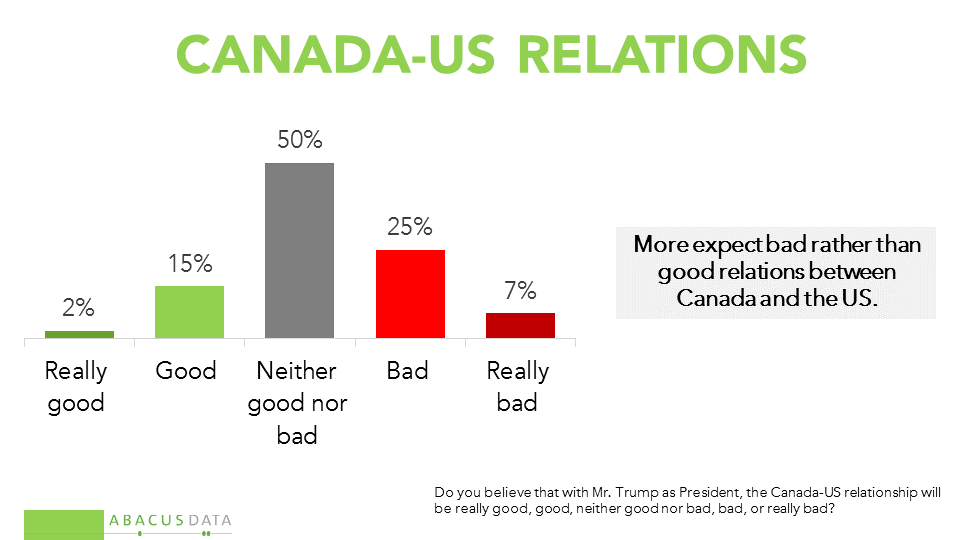

Finally, on the question of what Canada should do if the US shifts energy policy to lower costs and increase carbon, 72% of Canadians believe this country should stick with our plan to reduce emissions and shift to a cleaner energy economy, rather than slow the pace of our shift to make sure costs remain competitive.
This is the view of a large majority of NDP and Liberal supporters, all age groups, every region including Alberta, and even 50% of Conservative supporters.



UPSHOT
According to Bruce Anderson:
“Most likely, Canadians have never been as taken aback and anxious about the outcome of a US presidential election. Most voters didn’t anticipate this result and think it is worrying on many fronts. Not only do people think it will not ‘make America great again’ they believe America’s economic prospects and global influence will suffer.
People are worried about the risk of racial tensions and global conflict rising. The level of support for Donald Trump in Canada is very small. Most of those who voted Conservative last fall would not have voted for Mr. Trump if they had the chance.
Despite their views of the US president, the numbers imply that Canadians want their government to approach the relationship sensibly, with a willingness to look at a post-NAFTA agreement. That said, most don’t want Canada to follow a Trump lead on climate and carbon policy, including most Albertans and most Conservatives.
While some Conservatives share the delight expressed by former Minister and current leadership aspirant Kellie Leitch about the election of Mr. Trump, but they are but a fragment of the conservative base and the even smaller minority of Canadian voters.”
According to David Coletto:
“Our survey finds most Canadians are concerned, shocked, and even appalled by the U.S. election results. One in four 2015 Conservative voters said they were “really dismayed” by the results – a signal that even among the Conservative Party’s base of support, a pivot to Trump style politics will likely shrink the tent instead of growing it.
Politics is ultimately about contrast and comparisons. As a political leader, you’re often compared to your chief rival or the alternatives on offer. With President-elect Donald Trump, Prime Minister Trudeau will now have as severe a contrast of style and policy as possible. The data we released yesterday confirms that the result of the elections hasn’t dampened the government’s support but could impact support for the Conservative Party depending on who party members elect as their leader and whether he or she embraces a Trump-style agenda. The data clearly points to such an agenda being rejected by the vast majority of Canadians.”
METHODOLOGY
Our survey was conducted online with 2,200 Canadians aged 18 and over from November 11 to 13, 2016. A random sample of panelists was invited to complete the survey from a large representative panel of over 500,000 Canadians.
The Marketing Research and Intelligence Association policy limits statements about margins of sampling error for most online surveys. The margin of error for a comparable probability-based random sample of 2,200 is +/- 2.1%, 19 times out of 20.
The data were weighted according to census data to ensure that the sample matched Canada’s population according to age, gender, educational attainment, and region. Totals may not add up to 100 due to rounding.
ABACUS DATA INC.
We offer global research capacity with a strong focus on customer service, attention to detail and value-added insight. Our team combines the experience of our Chairman Bruce Anderson, one of Canada’s leading research executives for two decades, with the energy, creativity and research expertise of CEO David Coletto, Ph.D.




